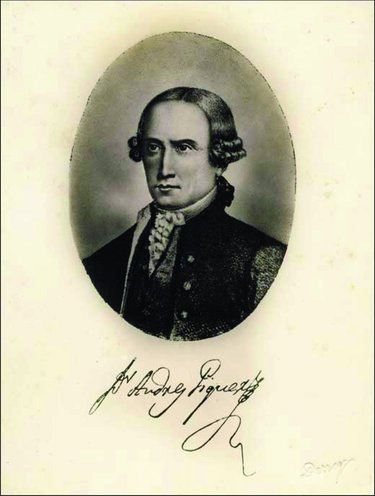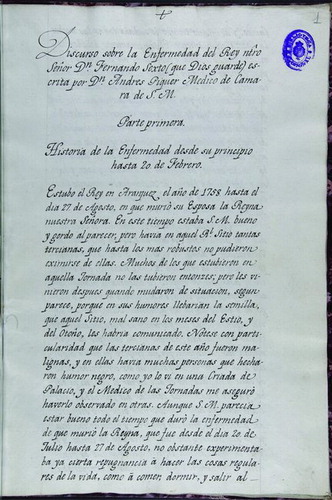Abstract
Largely unknown in Anglophonic medicine, eighteenth-century Spanish physician-scholar Andrés Piquer-Arrufat was early to coin a name (affectio melancholico-maníaca, or “melancholic-manic illness”) for the syndrome that emerged much later as manic-depressive illness and then bipolar disorder. He considered it a single, independent diagnostic entity, distinct from mania and melancholia, with varying manifestations over time. Piquer recognized mixed states, seasonality, and rapid cycling, and hypothesized “mental or cerebral damage” as underlying the disorder. His formulations evolved from clinical observations of patients over time, including his detailed longitudinal clinical description of Spanish King Ferdinand VI (1759), and as presented in his own medical textbook (1764). Piquer anticipated the often cited nineteenth-century works of Jean Falret and Jules Baillarger in Paris, and later, Emil Kraepelin in Heidelberg, by more than a century.
Appendix 1
Portrait of Dr. Andrés Piquer-Arrufat, from a Photoengraving by Derrey, Valencia, 1895.

Appendix 2
Title page of Piquer's Discurso sobre la enfermedad del rey nuestro Señor Fernando VI (que Dios guarde)

Discourse on the Illness of Our Lord King Ferdinand VI (Whom May God Protect) written by Dr. Andrés Piquer, Doctor of the Chamber of His Majesty
Part One
History of the Illness from the beginning until 20 February [1759]
The King resided in Aranjuez until 27 August 1758, when his spouse, Our Lady Queen, died. At that time, [His Majesty] seemed to have been healthy and well constituted, but, in that Royal region, there were epidemics of tertian fevers [malarial fevers] that even the most robust men did not get rid of. Many of those who stayed in that place did not suffer any malaise until they moved to other areas. It seems that they carried in their humors the seed that the unhealthy location transmitted to them in the months of the summer and autumn. It is noticeable that this year tertian fevers had been particularly harmful. Many people had secreted black bile. Indeed, I observed this in a female servant in the Palace as other Doctors did in others. Although [His Majesty] stayed well throughout his wife's illness, which lasted from 20 July until 27 August, he began to express feelings of distaste toward usual activities, like eating, sleeping or going to …
Notes
* The original manuscript of 67 unnumbered pages has been held at the Spanish National Library in Madrid after being transferred from the private library of the Duke of Osuna. Copies of the original can be requested (reference no. MSS-11201) from http://www.bne.es/es/Servicios/ReproduccionDocumentos/. The monograph is divided into two parts: Historia de la enfermedad desde su principio hasta 20 de Febrero (History of the Illness from the Beginning Until February 20 [pp. 1–32]) and Continuación de la historia de la enfermedad (Continuation of the History of the Illness [pp. 33–67]).
